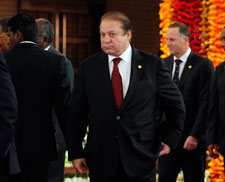On March 28, gunmen sprayed the car of TV anchor and widely-respected analyst Raza Rumi, a member of the Express Group of media organizations. He escaped serious injury, but his driver, Mustafa, died. It was the fourth attack on the Express Group in eight months, with four people dead. There has been no serious police investigation into the events which took place in Karachi, Peshawar, and now Lahore, where Rumi’s car was “bathed in bullets on one of city’s main arteries,” as The Express Tribune put it in an editorial on Sunday.
When our four-person CPJ delegation met with Prime Minister Nawaz Sharif and Minister Pervaiz Rasheed, who holds both the information and law portfolios, we came away impressed with their intent to come to grips with attacks on journalists in Pakistan. As we worked our way down our list of recommendations we found the government was already on the way to addressing many of them, and often planning solutions similar to those we were recommending. It’s our duty to remain skeptical, but we left with an entirely different feeling from the Sharif meeting than when we had met with President Asif Zardari in May 2011 or with Interior Minister Aftab Sherpao in July 2006 during the Musharraf government. In those meetings we were met with evasion, denial, and false promises. The current government knows it has a problem and wants to deal with it. At our meeting, Sharif suggested establishing a special commission which would propose measures to be adopted by the government to protect journalists in the field and ensure their well-being. A good idea, but one that will be a long time aborning.
But there are things that can be done immediately.
First and foremost, Friday’s attack on Rumi and his driver were crimes: murder and attempted murder. They must be investigated as such. It does not require a special commission, as came after the killing of Saleem Shazhad in 2011, or Hayatullah Khan in 2006, or after the sadistic attack on Umar Cheema in 2010. Practice has shown that those commissions achieve little or nothing, and the perpetrators go unprosecuted.
If local police cannot find it in their power to conduct an appropriate investigation and bring suspects to trial, then the federal government should step in and conduct its own investigation. And the federal government should do so quickly. Plans for “special prosecutors” abound in Pakistan, and many already exist at the federal and provincial level. The somewhat successful prosecution of killers in the Wali Khan Babar case set the pattern for pursuing difficult cases in which the perpetrators could be linked to powerful political, religious, or government agency-backed groups. All the tools used in the Babar case–special prosecutors, changes of court venue, the use of Anti-Terrorism Courts–should be brought to bear here too.
In 2012 CPJ published a blog post headed, “‘Where is the state?’ asks Pakistani journalist under threat.” The question, more of a plea, really, came from a TV producer in Karachi, and still rings true. Even as the Sharif government makes it plans to confront the impunity with which journalists and media houses are assaulted, it should act now to use the tools it already has at hand to address the steady stream of crimes against journalists that are continuing under its watch.
One other thing. “Should we stop telling the truth?,” The Express headlined its Sunday editorial. The answer is, “Of course not.” In fact, this and all other media houses in Pakistan–there are well over 500 news outlets–should use its reporters to investigate the attacks on the Express Group, as well as the other murders and apparent murders of journalists, the shooting, the bombings, the beatings, and the constant flow of threats, fatwas, and public denunciations under which Pakistani journalists work.
